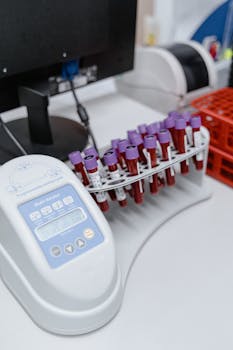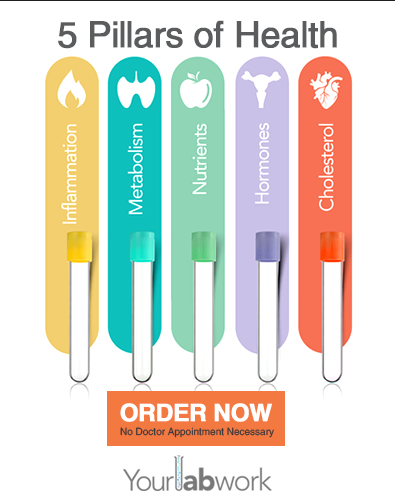Contact Us (720) 964-1335 or (901) 675-6125

Introduction
When you’re struggling to lose weight or manage your health, it’s easy to blame willpower or diet. But often, the real issue lies beneath the surface—in your lab work. As women over 40, we experience changes that affect everything from hormones to blood sugar. That’s why checking in with your labs isn’t just smart, it’s essential. Lab work can uncover hidden imbalances that stall progress, affect mood, and leave you feeling stuck despite doing “all the right things.”
Disclosure: This post contains affiliate links from one of our trusted partners. We may earn from qualifying purchases. There is no additional cost to you, and we only share products we personally recommend or believe align with Ample Health & Wellness values and mission.
Why Lab Work Matters in Weight Loss
Lab testing gives you insight into what’s happening on a deeper level. From thyroid slowdowns to insulin resistance, lab results help uncover the root causes behind stubborn weight, low energy, and mood swings. Instead of guessing or jumping from plan to plan, you’re making informed decisions based on your body’s data. This is especially important if you’ve hit a plateau or are transitioning off medications like GLP-1s.
Top 5 Labs to Consider
- Thyroid Panel (TSH, T3, T4)
A sluggish thyroid can slow metabolism and leave you feeling exhausted. Many doctors only test TSH, but a full panel gives you the clearest picture and can help guide treatment or nutrition adjustments. - Fasting Insulin + Glucose
These two numbers help detect early insulin resistance, a key reason many women over 40 struggle with weight around the midsection. Addressing insulin sensitivity can dramatically improve energy and fat loss. - Cortisol (AM/PM)
Chronic stress can throw off cortisol levels, leading to belly fat, disrupted sleep, sugar cravings, and burnout. Testing morning and evening cortisol shows if your stress hormone rhythm is out of sync. - Vitamin D and B12
These essential nutrients affect mood, energy, immune support, and metabolism. Many women are deficient and don’t realize how much it’s slowing them down—until they supplement correctly. - Inflammatory Markers (like hs-CRP)
Silent inflammation can block weight loss and increase disease risk. High CRP levels can be a sign your body is under stress from poor gut health, toxins, or unmanaged conditions.
How to Use Your Results to Guide Your Weight Loss Plan
Once you have your results, it’s time to make strategic changes. Low thyroid? Talk to your provider about options. High insulin? Focus on lower-carb, high-fiber meals and movement. High cortisol? Make stress reduction and better sleep a top priority. Use your labs like a compass and not a verdict. The goal is to create a personalized plan, not follow generic advice that may not fit your current physiology.
Why At-Home Testing Can Be a Game-Changer
Platforms like YourLabWork allow you to order tests directly with no appointment, no waiting rooms, no insurance hassles. The process is discreet, fast, and puts you back in control. This is ideal for busy women who juggle caregiving, work, and their own health. Once you get results, you can review them yourself or bring them to a trusted provider for next steps.
Special Note for GLP-1 Users or Those Transitioning Off
If you’re taking or transitioning off medications like Ozempic® or Wegovy®, your labs become even more important. These medications affect your appetite, glucose, insulin, and digestive hormones. Having a baseline and repeat labs ensures you’re not losing muscle, becoming nutrient-deficient, or missing underlying issues. Your labs provide clues and confidence to navigate the process wisely.
How to Order Through YourLabWork
I use and recommend YourLabWork because it offers access to the same weight loss labs I recommend to my clients without needing a doctor’s order. It’s affordable, easy to use, and you’ll get results fast. As an affiliate, I may earn a small commission if you order using my link (at no extra cost to you). That helps support this wellness mission and keeps resources like this available!
Ample Final Thoughts
If your body feels like a mystery, it might be time to get the facts. Lab testing puts you back in the driver’s seat. Whether you’re on medication, going through menopause, or just tired of guessing, this is your chance to make data-driven decisions. Start with one test. Build from there. Your body holds the answers and let’s uncover them together. Reviewing your results? …I’m here for you through Ample Health & Wellness.

About the Author: Written by Dr. Kisha Pickford, DNP, a Nurse Practitioner and Certified Holistic Nutrition Weight Loss Coach at Ample Health & Wellness. She helps women 40+ achieve sustainable weight loss and whole-body wellness.
📚 References
- Holtorf, K. (2011). The role of hormone imbalance in weight gain and resistance to weight loss. Med Hypotheses, 77(3), 371-378.
- American Thyroid Association. (2020). Thyroid and weight.
- Mayo Clinic. (2022). Metabolism and weight loss: How you burn calories.
